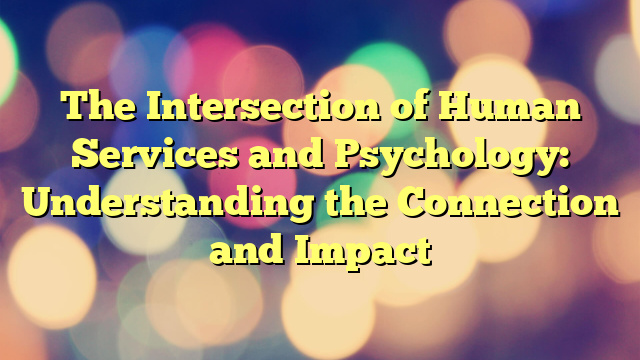The Intersection of Human Services and Psychology: Understanding the Connection and Impact
The Intersection of Human Services and Psychology: Understanding the Connection and Impact
Introduction
Human services and psychology are two fields that often intersect and work together to address the needs of individuals and communities. While they have distinct focuses and approaches, their connection is crucial in providing comprehensive support and promoting overall well-being. This article explores the intersection of human services and psychology, highlighting the connection between the two fields and the impact they have on individuals and society.
The Connection between Human Services and Psychology
Human services and psychology share a common goal of improving the lives of individuals and communities. Human services professionals work to meet the basic needs of individuals, such as food, shelter, and healthcare, while also addressing social and emotional challenges. Psychology, on the other hand, focuses on understanding human behavior and mental processes, aiming to enhance mental health and well-being.
These two fields intersect in various ways. Human services professionals often rely on psychological principles and theories to better understand the needs and behaviors of their clients. By applying psychological knowledge, they can develop effective interventions and strategies to support individuals in overcoming challenges and achieving their goals.
Psychologists, on the other hand, collaborate with human services professionals to provide comprehensive care. They may work together in settings such as community mental health centers, schools, or rehabilitation facilities. By combining their expertise, they can address both the immediate needs and the underlying psychological factors that contribute to an individual’s well-being.
The Impact of the Intersection
The intersection of human services and psychology has a significant impact on individuals and society as a whole. By integrating psychological principles into human services, professionals can provide more holistic and effective support to their clients. This approach recognizes the interconnectedness of physical, emotional, and social well-being, leading to improved outcomes.
For example, consider a homeless individual seeking assistance from a human services agency. By incorporating psychological knowledge, professionals can better understand the underlying factors contributing to their homelessness, such as mental health issues or trauma. This understanding allows them to develop tailored interventions that address both the immediate need for housing and the underlying psychological challenges, increasing the likelihood of long-term success and stability.
Furthermore, the intersection of human services and psychology promotes a more comprehensive understanding of social issues and their impact on individuals. By considering the psychological factors at play, professionals can develop strategies that address the root causes of social problems, rather than solely focusing on the symptoms. This approach has the potential to create lasting change and improve the overall well-being of individuals and communities.
Examples of the Intersection
The intersection of human services and psychology can be observed in various settings and contexts. Here are a few examples:
1. School Counseling
School counselors play a crucial role in supporting students’ academic, social, and emotional development. They often collaborate with human services professionals to address the diverse needs of students. By incorporating psychological principles, school counselors can provide individual and group counseling, develop intervention plans, and promote positive mental health within the school community.
2. Substance Abuse Treatment
Substance abuse treatment programs often involve a multidisciplinary approach that includes both human services and psychology professionals. Human services professionals may provide case management, connecting individuals with resources and support systems, while psychologists offer therapy and counseling to address the underlying psychological factors contributing to substance abuse.
3. Community Mental Health Centers
Community mental health centers serve as a hub for individuals seeking mental health support. These centers often employ a range of professionals, including psychologists and human services workers. Together, they provide a comprehensive range of services, including therapy, crisis intervention, case management, and support groups.
The Importance of Collaboration
Collaboration between human services and psychology professionals is essential for providing effective and comprehensive care. By working together, these professionals can leverage their respective expertise to address the complex needs of individuals and communities.
Collaboration allows for a more holistic understanding of individuals’ challenges and strengths. It enables professionals to develop interventions that consider the psychological, social, and environmental factors that influence well-being. This comprehensive approach increases the likelihood of positive outcomes and long-term success.
Furthermore, collaboration fosters a shared understanding and language between human services and psychology professionals. It promotes the exchange of knowledge, research, and best practices, leading to continuous improvement in the field. By learning from each other, professionals can enhance their skills and provide more effective support to those in need.
Conclusion
The intersection of human services and psychology is a powerful connection that enhances the support provided to individuals and communities. By integrating psychological principles into human services, professionals can address the complex needs of individuals and promote overall well-being. Collaboration between these fields is crucial for creating lasting change and improving the lives of those in need. Together, human services and psychology professionals can make a significant impact on individuals and society as a whole.

